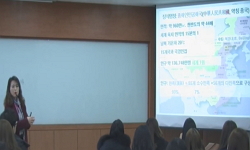On the detailed analysis of Mandarin Chinese (MC) locative inversion constructions from the aspect markers of le and zhe, verbs, agent and postverbal NP, this paper attempts to explain EPP and Case realization of locative inversion in MC. It suggested...
http://chineseinput.net/에서 pinyin(병음)방식으로 중국어를 변환할 수 있습니다.
변환된 중국어를 복사하여 사용하시면 됩니다.
- 中文 을 입력하시려면 zhongwen을 입력하시고 space를누르시면됩니다.
- 北京 을 입력하시려면 beijing을 입력하시고 space를 누르시면 됩니다.
https://www.riss.kr/link?id=A101743979
-
저자
( Ming Hao Jin ) (Yanbian University)

- 발행기관
- 학술지명
- 권호사항
-
발행연도
2015
-
작성언어
Korean
-
주제어
Locative inversion ; Mandarin Chinese ; MC ; EPP ; EXIST ; OCCUR
-
등재정보
KCI등재
-
자료형태
학술저널
- 발행기관 URL
-
수록면
27-43(17쪽)
-
KCI 피인용횟수
1
- DOI식별코드
- 제공처
-
0
상세조회 -
0
다운로드
부가정보
다국어 초록 (Multilingual Abstract)
On the detailed analysis of Mandarin Chinese (MC) locative inversion constructions from the aspect markers of le and zhe, verbs, agent and postverbal NP, this paper attempts to explain EPP and Case realization of locative inversion in MC. It suggested that Cases for PP-subjects may be realized differently from language to language. Unlike other languages, the PP-subjects in MC do not arise from locative inversion like those in English, but are introduced directly by the light verbs EXIST and OCCUR in the subject position which are used to satisfy the Case of EPP. These light verbs EXIST and OCCUR are the Case realization in MC, and DP after V in locative inversion constructions has partitive Case in LF.
참고문헌 (Reference)
1 Coopmam, P., "Where stylistic processes meet: Locative inversion in English" 65 : 728-751, 1989
2 Levin, B., "Unaccusativity: At the syntax-lexical semantics interface" The MIT Press 1995
3 Bobaljik, J., "Subject positions and the roles of TP" 27 : 195-236, 1996
4 Jang, Y. J., "Pseudo-gapping, locative inversion, and the EPP" 1996
5 Jaworska, E., "Prepositional phrases as subjects and objects" 22 : 355-374, 1986
6 Li, C. N., "Mandarin Chinese: A functional reference grammar" University of California Press 1981
7 Bresnan, J., "Locative inversion in Chichewa: A case study of factorization in grammar" 20 : 1-50, 1992
8 Bresnan, J., "Locative inversion and universal grammar" 70 (70): 72-131, 1994
9 Kim, J. M., "Locative inversion and functional constraint" 5 (5): 151-163, 1997
10 Colins, C., "Local Economy" The MIT Press 1997
1 Coopmam, P., "Where stylistic processes meet: Locative inversion in English" 65 : 728-751, 1989
2 Levin, B., "Unaccusativity: At the syntax-lexical semantics interface" The MIT Press 1995
3 Bobaljik, J., "Subject positions and the roles of TP" 27 : 195-236, 1996
4 Jang, Y. J., "Pseudo-gapping, locative inversion, and the EPP" 1996
5 Jaworska, E., "Prepositional phrases as subjects and objects" 22 : 355-374, 1986
6 Li, C. N., "Mandarin Chinese: A functional reference grammar" University of California Press 1981
7 Bresnan, J., "Locative inversion in Chichewa: A case study of factorization in grammar" 20 : 1-50, 1992
8 Bresnan, J., "Locative inversion and universal grammar" 70 (70): 72-131, 1994
9 Kim, J. M., "Locative inversion and functional constraint" 5 (5): 151-163, 1997
10 Colins, C., "Local Economy" The MIT Press 1997
11 Lin, T. H., "Light verb syntax and the theory of phrase structure" University of California 2001
12 Birner, B., "Information status and word order: An analysis of English inversion" 70 (70): 233-259, 1994
13 Huang, S., "Essays in the Grammar of Chinese" Crane 1982
14 Levin, B., "English verb classes and alternations: A preliminary investigation" University of Chicago Press 1993
15 김재민, "EPP and Case in Locative Inversion" 대한언어학회 15 (15): 239-256, 2007
16 Kim, J. M., "An analysis of English inversion: A discourse perspective" 8 (8): 43-58, 2000
동일학술지(권/호) 다른 논문
-
A Study of Mapping Between a Source Domain and a Target Domain in Food-Related Metaphors
- 대한언어학회
- 이희철 ( Hee Chul Lee )
- 2015
- KCI등재
-
The Effectiveness of Staged Translation in Young EFL Learners` Vocabulary Learning
- 대한언어학회
- 엄철주 ( Chul Joo Uhm )
- 2015
- KCI등재
-
영어 원어민과 한국인 영어 학습자 영어 초점 단어 모음 공간의 비교 연구
- 대한언어학회
- 전윤실 ( Yoon Shil Jeon )
- 2015
- KCI등재
-
영어 Out-of V-ing 사역구문: 말뭉치 자료를 중심으로
- 대한언어학회
- 심록 ( Rok Sim )
- 2015
- KCI등재
분석정보
인용정보 인용지수 설명보기
학술지 이력
| 연월일 | 이력구분 | 이력상세 | 등재구분 |
|---|---|---|---|
| 2027 | 평가예정 | 재인증평가 신청대상 (재인증) | |
| 2021-01-01 | 평가 | 등재학술지 유지 (재인증) |  |
| 2018-01-01 | 평가 | 등재학술지 유지 (등재유지) |  |
| 2017-03-14 | 학회명변경 | 영문명 : 미등록 -> The Linguistic Association of Korea |  |
| 2015-01-01 | 평가 | 등재학술지 유지 (등재유지) |  |
| 2011-01-01 | 평가 | 등재학술지 유지 (등재유지) |  |
| 2009-01-01 | 평가 | 등재학술지 유지 (등재유지) |  |
| 2007-01-01 | 평가 | 등재학술지 유지 (등재유지) |  |
| 2004-01-01 | 평가 | 등재학술지 선정 (등재후보2차) |  |
| 2003-01-01 | 평가 | 등재후보 1차 PASS (등재후보1차) |  |
| 2001-01-01 | 평가 | 등재후보학술지 선정 (신규평가) |  |
학술지 인용정보
| 기준연도 | WOS-KCI 통합IF(2년) | KCIF(2년) | KCIF(3년) |
|---|---|---|---|
| 2016 | 0.33 | 0.33 | 0.32 |
| KCIF(4년) | KCIF(5년) | 중심성지수(3년) | 즉시성지수 |
| 0.32 | 0.32 | 0.704 | 0.07 |




 KCI
KCI KISS
KISS






